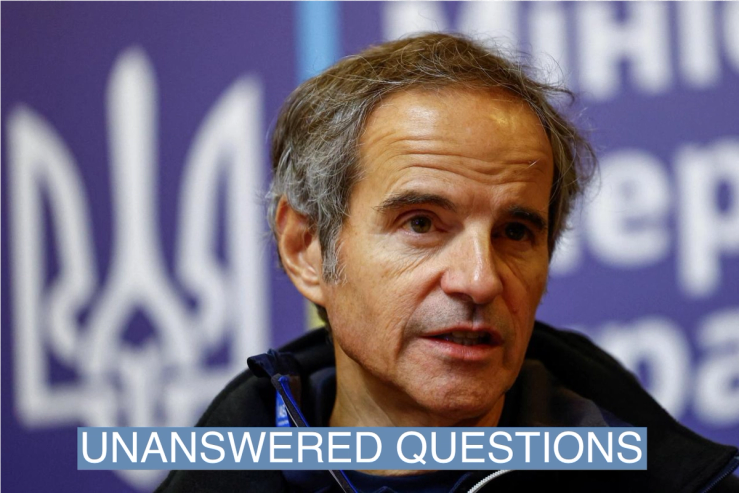The News
Western officials are increasingly alarmed by recent claims by senior Iranian leaders that the country now possesses all the components and nuclear fuel required to produce atomic weapons.
These officials told Semafor they are particularly focused on an interview broadcast Monday on Iranian state television with Ali Akbar Salehi, a former head of Iran’s Atomic Energy Organization and a chief negotiator involved in the 2015 agreement Tehran forged with the U.S. and global powers to limit Iran’s nuclear capabilities. The U.S.-educated Salehi is viewed as a relative moderate in the Islamic Republic’s theocratic system.
“We have [crossed] all the thresholds of nuclear science and technology,” Salehi said in the interview. “Here’s an example: Imagine what a car needs; it needs a chassis, an engine, a steering wheel, a gearbox. You’re asking if we’ve made the gearbox? I say yes. Have we made the engine? Yes, but each one serves its own purpose.”
Salehi’s comments drew a rebuke Tuesday from the head of the United Nations’ nuclear watchdog, the International Atomic Energy Agency, Rafael Grossi. The Argentinian diplomat has been in a standoff with Tehran over its refusal to allow his inspectors to visit multiple sites inside Iran where the IAEA believes there are undeclared nuclear materials and equipment.
“There’s loose talk about nuclear weapons more and more, including in Iran recently. A very high official said, in fact, we have everything, it’s disassembled,” Grossi said at a conference in Dubai. “Well, please let me know what you have.”
Salehi isn’t the first Iranian official in recent months to suggest Iran now has the capability to produce nuclear weapons. These claims appear to have increased since October 7 when the Palestinian militant group Hamas, which is armed and financed by Tehran, launched a terrorist attack on southern Israel. Since that time, Iran’s other Middle East allies, including militias in Yemen, Iraq, and Syria, have intensified attacks on U.S. bases and personnel in the region.
In late December, the IAEA warned that Iran had tripled its monthly production of weapons grade uranium and limited the ability of the agency’s inspectors to track Tehran’s nuclear advances.
In this article:
Jay’s view
The war in the Gaza Strip has significantly increased tensions between the U.S. and Iran, with the two countries in recent weeks moving dangerously close to a direct military confrontation. But U.S. officials are also concerned that Tehran may use the turmoil in the Mideast — and the West’s distraction — to further advance its nuclear capabilities, potentially irreversibly.
Officially, Tehran claims that the country’s Supreme Leader Ayatollah Ali Khamenei has issued a formal religious edict, or fatwa, against Iran developing nuclear weapons. Iranian officials have cited the fatwa in recent weeks in explaining why their country hasn’t crossed the weapons threshold. “Our policy was to not move towards nuclear weapons, even though we have the capability,” Kamal Kharrazi, a foreign policy advisor to Khamenei, told France 24 in November. “But we did not make that decision because building such a weapon would be against the Supreme Leader’s fatwa.”
But the conflict in Gaza, and the breakdown of the 2015 nuclear deal, is causing some Iranian officials, particularly inside its elite Islamic Revolutionary Guard Corps, to question adhering to the fatwa, according to former Iranian officials and IRGC-affiliated media. Iran’s possession of nuclear weapons could make it almost immune to outside attack, they say. And it could also potentially provide Iran with a nuclear umbrella through which to protect its allies in the Palestinian territories, Lebanon and in other Mideast theaters.
This January, the host of a show on an IRGC-affiliated channel sparked controversy by asking the current head of the Iran Atomic Energy Organization if Iran shouldn’t change its military doctrine. “Is it not time for Iran to produce its first nuclear weapon, given the ongoing conflict against Gaza and repeated threats from Israel?” Hossein Hosseini said.
The View From Washington
The Biden administration has been warning Tehran against further advancing its nuclear program, citing Iran’s growing production of uranium enriched to 60% purity. Nuclear fuel processed to 90% is considered usable in producing nuclear weapons. And the White House and Israel have indicated they’d consider taking military action if Iran’s leaders crossed that line.
But the Biden administration has also repeatedly stressed since October 7 that it’s not seeking a direct conflict with Iran. U.S. officials told Semafor that the Biden White House never seriously considered hitting Iran directly this month after an IRGC-backed militia killed three U.S service people in Jordan with an attack drone. Instead, the Pentagon struck Iranian proxies in Iraq and Syria and killed no senior IRGC personnel.
U.S. officials continue to signal that they’d like to try and revive the 2015 nuclear deal, known as the Joint Comprehensive Plan of Action (JCPOA), to reduce tensions, even in a truncated form. Tehran has shown little interest in recent months in doing so. “We remain committed to a diplomatic solution and reaffirm our determination that Iran must never develop a nuclear weapon,” the State Department said in a December statement.
Notable
- Major General Hossein Salami, the IRGC’s commander-in-chief, has threatened reprisals against the U.S. if the Pentagon directly strikes Iran or IRGC personnel


